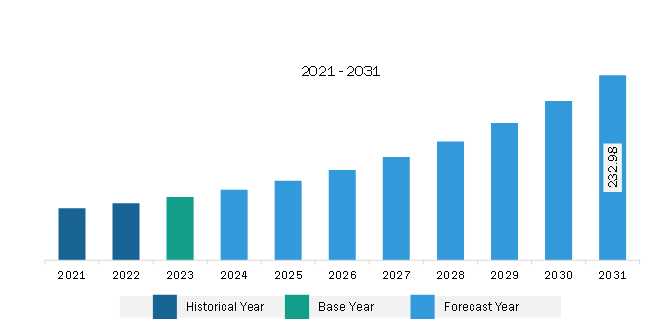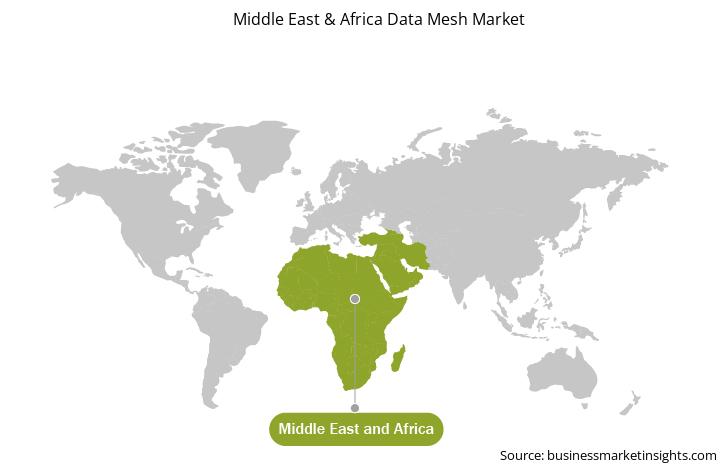The Middle East & Africa data mesh market was valued at US$ 79.41 million in 2023 and is expected to reach US$ 232.98 million by 2031; it is estimated to register a CAGR of 14.4% from 2023 to 2031.
In the evolving landscape of data mesh architecture, the idea of federated computational governance presents a significant opportunity. It provides a radical change to businesses in handling and controlling their dispersed data. The federated computational governance strategy is a decentralized model in which governance is not centralized but distributed among an organization's data domains and areas of expertise. A paradigm known as federated computational governance assures quality, security, and compliance across interconnected data domains while promoting cooperation and decision-making. Federated computational governance in this context makes it possible to construct federated data ownership, in which domain-specific specialists are in charge of guaranteeing the security, privacy, and quality of their data instead of a central governing authority. Federated computational governance is a framework that facilitates collaboration and decision-making by assuring quality, security, and compliance across interconnected data domains. The federated computational governance context makes it possible to establish federated data ownership to ensure the security, quality, and privacy of data. This context is used by domain-specific experts rather than a central governing body for appropriately managing the large amount of data in a specific domain of an organization, including marketing and sales, human resources, finance and accounting, research and development, and others. For instance, according to the ZipDo report of August 2023, financial sector investment in big data and business analytics reached US$ 100.2 billion in 2023, an increase of 43.0% from 2020. The finance and accounting domain deals with large amounts of data on a daily basis, which increases the demand for data mesh solutions among organizations for managing accurately and making real-time decisions. Data mesh encourages a sense of accountability and ownership among domain experts and data stewards. This distributed ownership brings governance techniques closer to the subtleties and complexities of the finance and accounting data domain and is expected to create opportunities in the market during the forecast period.
The banking industry in the UAE is experiencing significant growth and transformation, with a focus on digital banking solutions and personalized services driven by data analytics. As the industry evolves, there is a growing trend toward embracing advanced data management frameworks such as data mesh. By adopting the principles of data mesh, banks in the UAE can navigate the complexities of the modern banking landscape with greater efficiency and innovation. The decentralized nature of data mesh aligns well with the dynamic and diverse requirements of the banking sector, making it a promising approach for transforming data management practices in the industry. This decentralized approach enhances agility as individual units can respond quickly to changing business requirements, enabling faster innovation, decision-making, and adaptation to market dynamics.

Strategic insights for the Middle East & Africa Data Mesh provides data-driven analysis of the industry landscape, including current trends, key players, and regional nuances. These insights offer actionable recommendations, enabling readers to differentiate themselves from competitors by identifying untapped segments or developing unique value propositions. Leveraging data analytics, these insights help industry players anticipate the market shifts, whether investors, manufacturers, or other stakeholders. A future-oriented perspective is essential, helping stakeholders anticipate market shifts and position themselves for long-term success in this dynamic region. Ultimately, effective strategic insights empower readers to make informed decisions that drive profitability and achieve their business objectives within the market.

| Report Attribute | Details |
|---|---|
| Market size in 2023 | US$ 79.41 Million |
| Market Size by 2031 | US$ 232.98 Million |
| Global CAGR (2023 - 2031) | 14.4% |
| Historical Data | 2020-2021 |
| Forecast period | 2023-2031 |
| Regions and Countries Covered | Middle East and Africa
|
| Market leaders and key company profiles |
The geographic scope of the Middle East & Africa Data Mesh refers to the specific areas in which a business operates and competes. Understanding local distinctions, such as diverse consumer preferences (e.g., demand for specific plug types or battery backup durations), varying economic conditions, and regulatory environments, is crucial for tailoring strategies to specific markets. Businesses can expand their reach by identifying underserved areas or adapting their offerings to meet local demands. A clear market focus allows for more effective resource allocation, targeted marketing campaigns, and better positioning against local competitors, ultimately driving growth in those targeted areas.

The Middle East & Africa data mesh market is categorized into solution, deployment, application, industry vertical, and country.
Based on solution, the Middle East & Africa data mesh market is segmented into data integration and delivery, federated data governance, data operations, data transformation and orchestration, and others. The data integration and delivery segment held the largest market share in 2023.
In terms of deployment, the Middle East & Africa data mesh market is bifurcated into on-premise and cloud. The cloud segment held a larger market share in 2023.
By application, the Middle East & Africa data mesh market is segmented into customer experience engagement, data privacy management, IOT monitoring, and others. The data privacy management segment held the largest market share in 2023.
By industry vertical, the Middle East & Africa data mesh market is segmented into BFSI, retail and e-commerce, IT and telecom, healthcare, government and utilities, and others. The BFSI segment held the largest market share in 2023.
By country, the Middle East & Africa data mesh market is segmented into South Africa, Saudi Arabia, the UAE, and the Rest of Middle East & Africa. The UAE dominated the Middle East & Africa data mesh market share in 2023.
Microsoft Corp; Alphabet Inc; Oracle Corp; International Business Machines Corp; Amazon.com Inc; QlikTech International AB; Confluent Inc; Hitachi Vantara Corp; Dremio Corp; SAP SE; Snowflake Inc; K2view Ltd; Denodo Technologies, Inc; Informatica Corp; Estuary Technologies, Inc.; Databricks Inc; Cisco Systems Inc; TIBCO Software Inc.; Autodesk Inc; and Adobe Inc are some of the leading companies operating in the Middle East & Africa data mesh market.
The Middle East & Africa Data Mesh Market is valued at US$ 79.41 Million in 2023, it is projected to reach US$ 232.98 Million by 2031.
As per our report Middle East & Africa Data Mesh Market, the market size is valued at US$ 79.41 Million in 2023, projecting it to reach US$ 232.98 Million by 2031. This translates to a CAGR of approximately 14.4% during the forecast period.
The Middle East & Africa Data Mesh Market report typically cover these key segments-
The historic period, base year, and forecast period can vary slightly depending on the specific market research report. However, for the Middle East & Africa Data Mesh Market report:
The Middle East & Africa Data Mesh Market is populated by several key players, each contributing to its growth and innovation. Some of the major players include:
The Middle East & Africa Data Mesh Market report is valuable for diverse stakeholders, including:
Essentially, anyone involved in or considering involvement in the Middle East & Africa Data Mesh Market value chain can benefit from the information contained in a comprehensive market report.